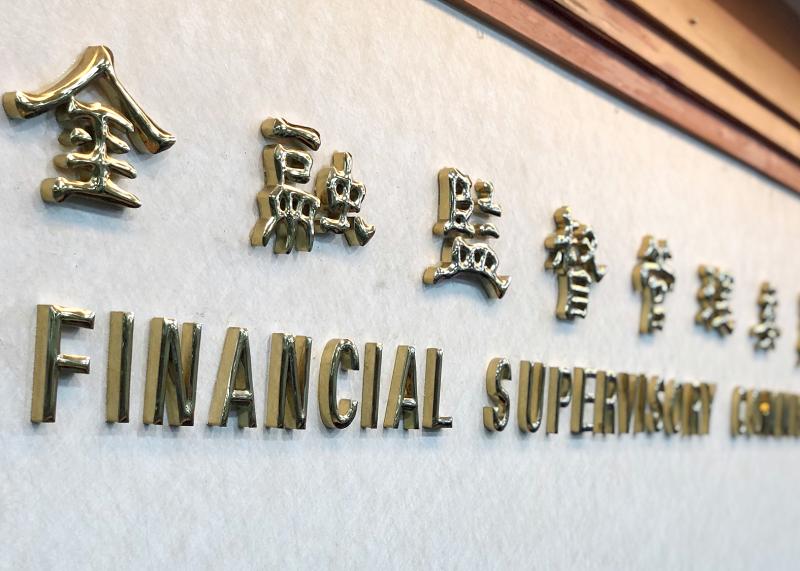Combined net profit at overseas branches of local banks declined for the third consecutive quarter to NT$10.25 billion (US$355.68 million) last quarter, affected by bad loans amid the COVID-19 pandemic, Financial Supervisory Commission (FSC) data released on Monday showed.
Last quarter’s 50 percent decline was slightly milder than the 52 percent fall to NT$9.39 billion in the second quarter, but steeper than the 15 percent drop to NT$15.84 billion in the first quarter, the data showed.
Overseas branches this year generated less net interest income due to interest rate cuts worldwide and higher loan loss provisions amid the pandemic, the data showed.

Photo: Kelson Wang, Taipei Times
They registered an average non-performing loan (NPL) ratio of 0.45 percent as of the end of September, up from 0.19 percent a year earlier, the FSC said.
In the first three quarters, they set aside NT$10 billion in additional provisions from a year earlier, it said.
Hong Kong remained the most lucrative overseas market, despite political unrest in the territory, the commission said.
However, Hong Kong branches’ combined net profit still fell 49 percent year-on-year to NT$5.2 billion last quarter after dropping 36 percent to NT$6.87 billion in the second quarter and declining 15 percent to NT$8.22 billion in the first quarter, it said.
Mainland China remained the second-most profitable market, it said.
Branches there reported combined net profit rose 7.5 percent to NT$1.72 billion last quarter due to fewer bad loans, the FSC said.
US branches reported a combined net loss of NT$460 million, compared with net profit of NT$1.59 billion in the third quarter last year, but net profit at branches declined 65 percent to NT$820 million, it said.
Branches in the Philippines, France and the UK reported widening losses of NT$580 million, NT$60 million and NT$320 million respectively, the data showed.
Overseas branches of O-Bank Co (王道商業銀行), Chang Hwa Bank (彰化銀行) and CTBC Bank (中國信託銀行) were hardest hit, with their NPL ratios tallying 1.75, 1.71 and 1.46 percent respectively as of the end of September, the data showed.

Taiwan’s rapidly aging population is fueling a sharp increase in homes occupied solely by elderly people, a trend that is reshaping the nation’s housing market and social fabric, real-estate brokers said yesterday. About 850,000 residences were occupied by elderly people in the first quarter, including 655,000 that housed only one resident, the Ministry of the Interior said. The figures have nearly doubled from a decade earlier, Great Home Realty Co (大家房屋) said, as people aged 65 and older now make up 20.8 percent of the population. “The so-called silver tsunami represents more than just a demographic shift — it could fundamentally redefine the

The US government on Wednesday sanctioned more than two dozen companies in China, Turkey and the United Arab Emirates, including offshoots of a US chip firm, accusing the businesses of providing illicit support to Iran’s military or proxies. The US Department of Commerce included two subsidiaries of US-based chip distributor Arrow Electronics Inc (艾睿電子) on its so-called entity list published on the federal register for facilitating purchases by Iran’s proxies of US tech. Arrow spokesman John Hourigan said that the subsidiaries have been operating in full compliance with US export control regulations and his company is discussing with the US Bureau of

Businesses across the global semiconductor supply chain are bracing themselves for disruptions from an escalating trade war, after China imposed curbs on rare earth mineral exports and the US responded with additional tariffs and restrictions on software sales to the Asian nation. China’s restrictions, the most targeted move yet to limit supplies of rare earth materials, represent the first major attempt by Beijing to exercise long-arm jurisdiction over foreign companies to target the semiconductor industry, threatening to stall the chips powering the artificial intelligence (AI) boom. They prompted US President Donald Trump on Friday to announce that he would impose an additional

China Airlines Ltd (CAL, 中華航空) said it expects peak season effects in the fourth quarter to continue to boost demand for passenger flights and cargo services, after reporting its second-highest-ever September sales on Monday. The carrier said it posted NT$15.88 billion (US$517 million) in consolidated sales last month, trailing only September last year’s NT$16.01 billion. Last month, CAL generated NT$8.77 billion from its passenger flights and NT$5.37 billion from cargo services, it said. In the first nine months of this year, the carrier posted NT$154.93 billion in cumulative sales, up 2.62 percent from a year earlier, marking the second-highest level for the January-September